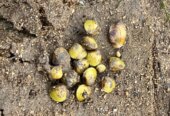
Rain on Monday was the first a Parawera dairy farmer has seen this month – now consistency will be key to making further in roads towards combating a hot, dry summer.
“Up until just before Christmas, we were really pleased with the regular rainfall we’d been getting.
“And, some rain on Christmas Day was a fabulous Christmas present too,” Jennie Macky said.
Jennie and her husband James have been farming at their 220 effective hectare property 15 kilometres southeast of Te Awamutu since 2008.
They became farm owners there in 2022 and have about 1000 cows.
A second smaller farm the Mackys lease in Kihikihi is about 74 effective hectares.

Jennie Macky
Rain gauge data at the Macky’s Parawera property shows more than 50mm of rain fell in October, November and December respectively.
At last check on Monday, roughly 10mm of rain had fallen.
There are times though, Jennie said, when she and James can watch rain falling in nearby areas such as Pirongia from their property, but it ends up bypassing them.
“Given the high heat we’ve been having, and the wind, any moisture dries up very quickly.
“We’re not necessarily after big downpours. Rather, consistent, separate rainfall events of anything just over 10mm are what really make a cumulative difference.”
Jennie, an experienced dairy vet, told The News there are two key considerations shehas been telling clients to be aware of at this time of year.
And they are foremost in her mind on farm too.
Those are the importance of avoiding heat stress on cows – the Mackys have sprinklers installed in their cow shed yards to this end – and having an awareness of any possible increases in “excessive” spores which cause facial eczema in light of this week’s rain.
Facial eczema spores are fungal spores in the pasture.
They produce a toxin which damages a cow’s liver and can cause skin irritation.
Cows which have facial eczema often display lower milk production than cows which don’t, and it can sometimes result in death.
And, night temperature above 12 degrees Celsius, coupled with rainfall, can result in high humidity – potentially giving rise to rapid spore count increases. “That obviously means now is a good time to start monitoring spore counts,” Jennie said.









